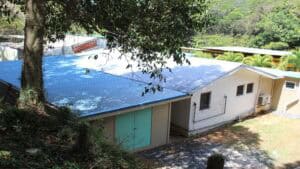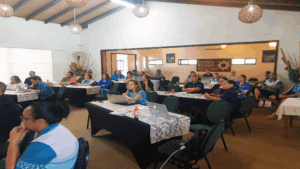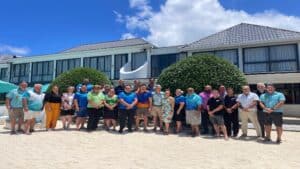Strong community momentum drives shelter programme forward
RAROTONGA, COOK ISLANDS, 25 July 2025. The Office of the Prime Minister (OPM) together with Cook Islands Investment Corporation (CIIC) confirms that four community halls have now been approved for funding and are actively progressing under the Rarotonga Safety Shelter Programme (RSSP) — a major milestone reflecting the strength of community partnerships and coordination across government.
Seven months into implementation, the RSSP continues to gain momentum across the island, with four community halls now approved by Cabinet and at various stages of upgrade. The Tutakimoa Meeting House is nearing completion, while construction is underway at the Ngatangiia Cook Islands Christian Church (CICC) Sunday School Hall. Preparations are also progressing for works at Pokoinu Meeting House and Sacred Heart Parish in Matavera. All four halls are being strengthened to be compliant under the Cook Islands Building Code 2019.
Mr. John Strickland, Director of EMCI says “We are pleased with the progress to date. The Rarotonga Safety Shelter Programme is a critical part of our broader efforts to strengthen national disaster preparedness— providing safe refuge for both residents and visitors. While RSSP is currently focused on Rarotonga, EMCI continues to support a range of emergency preparedness initiatives across all islands. Together, these efforts contribute to building a safer and more resilient Cook Islands for everyone.”
The RSSP was formally launched in December 2024, following detailed assessments of 19 community halls designated or identified as suitable cyclone shelters. Structured to reinforce existing community infrastructure, the RSSP aims to ensure that a significant portion of Rarotonga’s population has access to reliable, safe, and inclusive shelters during a declared State of Disaster or State of Emergency. Through a coordinated approach between Government and community-led groups, the programme has quickly moved from planning, to action.
Mr. Allan Jensen, CEO of CIIC says “This programme represents a considered co-investment in durable, fit-for-purpose infrastructure. While the immediate objective is compliance with shelter standards, the long-term benefit lies in strengthening community facilities that are built to serve multiple purposes over time. Partnerships with community groups enables more efficient use of public resources, ensuring that infrastructure delivery is both practical and sustainable in the long run.”
As each hall progresses, the focus now shifts toward the successful completion of renovation works and the formal certification of these buildings as compliant safety shelters. While the momentum to date is encouraging, delivering a fully functional shelter requires sustained effort, from securing materials and labor, to coordinating timelines that work around community availability.
Mr. Joseph Akaruru, of Tutakimoa Meeting House says “Securing the funding is just one part of the puzzle, we’re extremely fortunate to have received financial support from our Tutakimoa Ekalesia, the India Grant Fund, and the Cook Islands Government. Our community started off strong, with many hands eager to support the project. As time has passed, a core group has remained strong, showing up after hours, on weekends, and around their own personal commitments. It’s a big ask, and it reflects the dedication of those still involved in seeing this building through to completion.”
The RSSP is funded by Cook Islands taxpayer funds, with each eligible community hall able to access up to NZ$100,000.00 under the RSSP framework. The framework establishes that communities have access to the fund on a first-come-first-serve basis, provided that the identified hall has been assessed by CIIC and EMCI for suitability as shelter, that all required documents are in order and any additional funding required for renovations are raised by the community and confirmed prior to progressing through the programme.
All eligible community halls have been contacted by CIIC, any queries regarding the programme can be directed to ciic.rsspcoordinator@cookislands.gov.ck.
end.
Further information
Enquiries about this news release should be made to Rebecca Tavioni on +682 56621 or by email to ciic.rsspcoordinator@cookislands.gov.ck
About the Rarotonga Safety Shelter Program
The Rarotonga Safety Shelter Program (RSSP) was established in 2021 to support remediation works to community/public buildings designated or identified as suitable cyclone shelters. Through collaborative efforts and careful management, the programme aims to ensure that a significant portion of Rarotonga’s population has access to safe shelters during emergencies. The programme represents a crucial step towards enhancing community resilience to cyclones and other disasters.
About Emergency Management Cook Islands
Emergency Management Cook Islands (EMCI) is a dedicated subsidiary division within the Cook Islands Office of the Prime Minister constituted with the management of the Disaster Risk Management Act 2007. EMCI is dedicated to protecting the community, environment, and cultural heritage by effectively managing and mitigating the impacts of natural and human caused emergencies (https://emci.gov.ck/)
About Cook Islands Investment Corporation
The Cook Islands Investment Corporation (CIIC) is a statutory incorporation of the Cook Islands Government. CIIC was established through the Cook Islands Investment Incorporation Act 1998, tasked with the management of Crown assets and interests within the Cook Islands, their vision is “quality assets that serves the Cook Islands people”. (https://www.ciic.gov.ck/)
About the Office of the Prime Minister
The Office of the Prime Minister (OPM) is a Central agency that supports the Prime Minister and Cabinet. OPM deliver core government functions for Public Sector and coordinate governance activities across agencies, their vision “a well governed, resilient and secure Cook Islands”. (https://www.pmoffice.gov.ck/)
About the Cook Islands
The Cook Islands is a self-governing democracy comprising 15 islands in the South Pacific of c. 15,000 people operating in free association with New Zealand.



